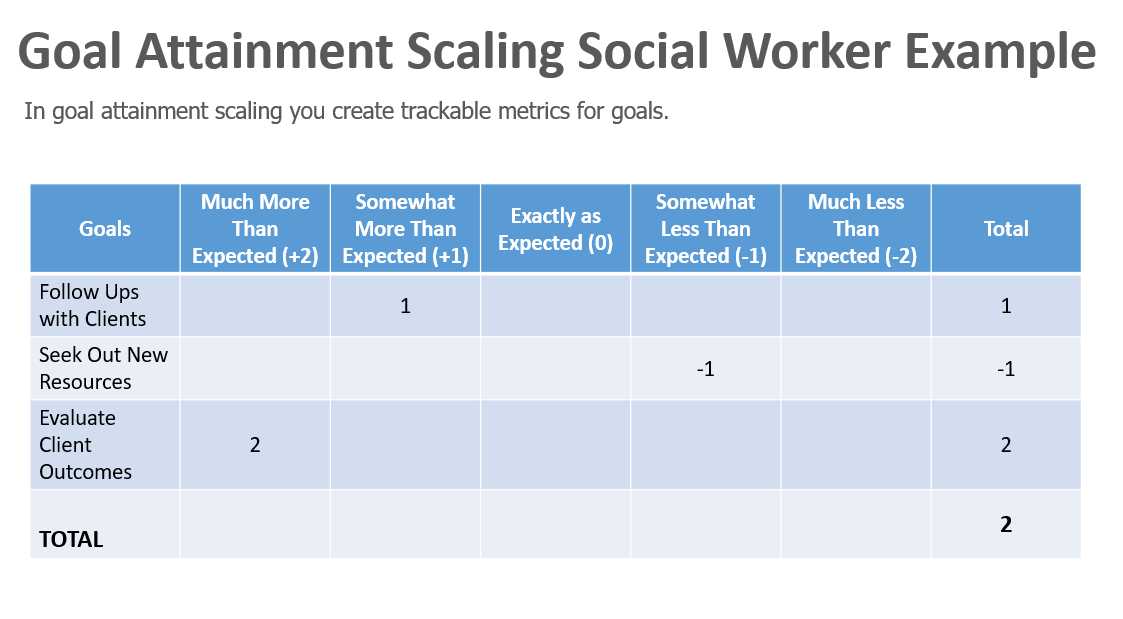What is evaluation in social work?
What is evaluation in social work practice?
Evaluation provides the information necessary to examine how well a program or initiative is being implemented
and determine whether that program is achieving desired results.
What is an example of evaluation in social work?
For example, social workers might wish to evaluate the extent to which child health goals (outcomes) were
achieved with an intervention program for empowering parents to eliminate their young children’s exposure to
third-hand smoke.
What are the 4 types of evaluations?
The four basic types of evaluation are:
- Clinical reviews
- Clinical trials
- Program reviews
- Program trials
What are the 3 types of evaluation?
The three types of evaluation are:
- Formative Evaluation
- Summative Evaluation
- Diagnostic Evaluation
What are the 3 methods of evaluation?
Evaluation Methods:
- Quantitative Methods
- Qualitative Methods
- Mixed Methods
What are some examples of evaluation?
An example of an evaluation policy is:
- Our project will have strategies in place so the staff and the advisory committee are able to:
- Identify the extent to which the project is achieving its aims and objectives (consistent with its core
values) - Continually improve the work of the project and
What are 3 examples of evaluation forms?
Examples of evaluation forms:
- Employee Evaluation Form
- Customer Service Evaluation Form
- Peer Evaluation Form
- Performance Improvement Plan Form
- Event Evaluation Form
- Training Course Feedback Template
What is an example of evaluation?
An evaluation is an appraisal of something to determine its worth or fitness. For example, before you start an
exercise program, get a medical evaluation, to make sure you’re able to handle the activity.
What are the 2 basic types of evaluation?
Outcome/effectiveness evaluation measures program effects in the target population by assessing the progress in
the outcomes or outcome objectives that the program is to achieve. Impact evaluation assesses program
effectiveness in achieving its ultimate goals.
What is the purpose of an evaluation?
Evaluation provides a systematic method to study a program, practice, intervention, or initiative to understand
how well it achieves its goals. Evaluations help determine what works well and what could be improved in a
program or initiative.
What are the three main purposes of evaluation?
This article discusses the relationships between the three main goals of evaluation (to learn, measure, and
understand) and the various types of evidence (evidence of presence, of difference-making, of mechanism) which
are produced and/or used in the evaluation process.
What is the main purpose of evaluation?
Evaluation provides a systematic method to study a program, practice, intervention, or initiative to understand
how well it achieves its goals. Evaluations help determine what works well and what could be improved in a
program or initiative.


What is evaluation in social work practice
Evaluation provides the information necessary to examine how well a program or initiative is being implemented and determine whether that program is achieving desired results.
CachedSimilar
What is an example of evaluation in social work
For example, social workers might wish to evaluate the extent to which child health goals (outcomes) were achieved with an intervention program for empowering parents to eliminate their young children's exposure to third-hand smoke.
Cached
What are the 4 types of evaluations
The four basic types of evaluation: clinical reviews, clinical trials, program reviews, and program trials.
What are the 3 types of evaluation
The three types of evaluation are:Formative Evaluation.Summative Evaluation.Diagnostic Evaluation.
What are the 3 methods of evaluation
Evaluation MethodsQuantitative Methods.Qualitative Methods.Mixed Methods.
What are some examples of evaluation
An example of an evaluation policy is: Our project will have strategies in place so the staff and the advisory committee are able to: Identify the extent to which the project is achieving its aims and objectives (consistent with its core values) Continually improve the work of the project and.
What are 3 examples of evaluation forms
Evaluation Forms ExamplesEmployee Evaluation Form.Customer Service Evaluation Form.Peer Evaluation Form.Performance Improvement Plan Form.Event Evaluation Form.Training Course Feedback Template.
What is an example of evaluation
An evaluation is an appraisal of something to determine its worth or fitness. For example, before you start an exercise program, get a medical evaluation, to make sure you're able to handle the activity.
What are the 2 basic types of evaluation
Outcome/effectiveness evaluation measures program effects in the target population by assessing the progress in the outcomes or outcome objectives that the program is to achieve. Impact evaluation assesses program effectiveness in achieving its ultimate goals.
What is the purpose of an evaluation
Evaluation provides a systematic method to study a program, practice, intervention, or initiative to understand how well it achieves its goals. Evaluations help determine what works well and what could be improved in a program or initiative.
What are the three main purposes of evaluation
This article discusses the relationships between the three main goals of evaluation (to learn, measure and understand) and the various types of evidence (evidence of presence, of difference-making, of mechanism) which are produced and/or used in the evaluation process.
What is the main purpose of evaluation
Evaluation provides a systematic method to study a program, practice, intervention, or initiative to understand how well it achieves its goals. Evaluations help determine what works well and what could be improved in a program or initiative.
What is the goal of evaluation
The common goal of most evaluations is to extract meaningful information from the audience and provide valuable insights to evaluators such as sponsors, donors, client-groups, administrators, staff, and other relevant constituencies. Most often, feedback is perceived as useful if it helps in decision-making.
What are examples of evaluation purpose
In many cases, the purpose of an evaluation is to improve a program. Other types of evaluation purposes include accountability, measuring effectiveness, assessing replicability of a program to other sites, determining what program components are essential, or making decisions about a program's fate.



